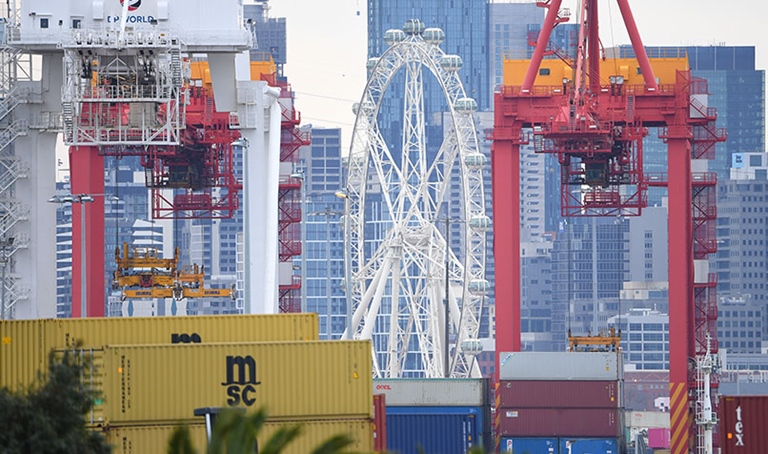Loading component...
At a glance
- In uncertain times, when there is a lull in activity, businesses that use the opportunity to review and reset their priorities stand a strong chance of making it through challenges.
- A recession presents a chance to reset an economy if a government acts decisively in key areas such as stimulus packages, skilled migration and increased productivity through smart investments.
- cEconomists anticipate prolonged economic uncertainty, but are confident recovery will certainly be led by technology-intensive jobs and industries.
During a recession, and at a time when many eateries are shutting their doors, restaurateurs Dan and Steph Mulheron are expanding their business portfolio.
The stars of reality TV cooking show My Kitchen Rules – undeterred by the impact of COVID-19 – are putting their faith in Queensland’s Hervey Bay, a regional whale-watching haven that is flourishing as domestic tourists explore their own backyard amid international travel restrictions.
In addition to their cafe EAT and fine-dining restaurant The Vinyard, they have taken the bold step of opening an upmarket casual eatery called Black Bear.
“Hervey Bay is teeming with people. We haven’t seen it this busy for a few years,” Steph says. “Everyone has gone through such a rough 2020, but I feel as though the restaurant industry is just going to thrive, because no one wants to be locked up at home anymore.”
The show of confidence backs the view that regional cities and towns will emerge from COVID-19 stronger than most because of local tourism and the work-from-home trend, which means fewer people will feel tied to capital cities.
Rather than succumbing to the recession, Steph says she and Dan have used the time to reset their business priorities, including releasing cooking ebooks and a range of gourmet sausages into Coles supermarkets. “We decided to be proactive rather than negative.”

Winners and losers in COVID-19 aftershock
Although COVID-19 tipped Australia into its first recession in about three decades, the country appears better placed than most to rebound.

Richard Holden, professor of economics at UNSW Business School, says “fast and fairly aggressive” stimulus measures have paid off. “Most importantly, with the exception of Victoria, we’ve done really well on the virus management front. That’s a big factor, because countries that are faring the worst around the world are also generally those that have had the worst public health outcomes.”
Holden says the recession provides a once-in-a-lifetime chance to reset the economy, but the government must act decisively in key areas for maximum effect. This includes continuing stimulus packages, accelerating highly skilled immigration, increasing productivity through smart investment, ushering in industrial relations reform, initiating tax reform to encourage international investment in venture capital, and creating new jobs through more flexible employment and pay conditions.
“The pandemic provides the opportunity for things that have stumbled at the political starting gate to be revisited,” he says.
"The pandemic provides the opportunity for things that have stumbled at the political starting gate to be revisited."
In its December 2020 economic outlook, the Organisation for Economic Co-operation and Development (OECD) states that, with the pandemic continuing to threaten jobs, businesses and the health of people around the world, “building confidence will be crucial to ensure that economies recover and adapt”.
The OECD projects global GDP growth of about 4 per cent in 2021, after a fall of about 4.5 per cent in 2020. China is expected to return to its past trajectory of growth at about 8 per cent in 2021.
The current projection for Australia is GDP growth of about 3.2 per cent in 2021. The report states that “a risk is that the recovery in business and consumer sentiment is hampered by a rise in business insolvencies and renewed labour market weakness as policy support is scaled back in 2021.”
This one is different
Shane Oliver, AMP Capital chief economist, says the current recession in Australia is unlike those of the 1980s and 1990s. Whereas recessions typically follow booms that prompt central banks to step in to cool things down, this downturn has been driven by a shutdown for health reasons, so it has been far more rapid, and governments have moved to prop up the pandemic-stricken economy.
“There will be a day of reckoning when those stimulus measures will be wound down, but it probably won’t be as bad as the alarmists were talking about in relation to a fiscal cliff,” Oliver says.
The ramifications for business will unfold on a “case-by-case basis”. Online retailers and health providers could do well, along with people working in public administration roles and some pockets of manufacturing. “If you’re in bricks and mortar retail, it looks worse though,” Oliver adds.
Paradoxically, given Australia’s strict border closures, Holden believes bringing in skilled immigrants presents a chance to ramp up economic activity and productivity as the nation emerges from the recession.
While there will be trepidation about the movement of people internationally, Australia has emerged as a safer country than most during the pandemic, with comparatively low COVID-19 infection and death rates. “Right now, we’re a very attractive country,” Holden says.
CPA Australia podcast:
What recovery will look like

In the so-called new normal, one of the few certainties should be that technology-intensive jobs and industries will help lead economic recovery in Australia.
With people embracing new platforms on which to work, learn, shop and socialise remotely, tech companies have been one of the beneficiaries of social distancing restrictions.
James Mabbott, national leader with KPMG Innovate, envisages four stages on the path to recovery – reaction (focusing on saving lives and livelihoods), resilience (loosening controls as the virus is contained or mass vaccination programs are rolled out), recovery (with hiring, investment and consumer sentiment starting to improve), and a new reality (where enduring trends set in as a result of new behaviours from COVID-19).
While most people are still living in “stage one” as they navigate working from home and potential job financial insecurity, Mabbott says over the long term we can expect a significant transformation of industries and society.
He expects investment in and around artificial intelligence and digital technology to skyrocket as people turn to hi-tech channels for remote work and entertainment. Advances around digital commerce and the delivery of goods to homes are also likely.
“That’s an ongoing trend that has been accelerated and driven by investment and a continued focus on digital infrastructure.” With people embracing new platforms on which to work, learn, shop and socialise remotely, tech companies have been among the beneficiaries of social distancing restrictions.
Mabbott also thinks climate change and environmental issues will stay on the agenda as a heightened sense of community convinces organisations to think beyond financial results.
While a quick economic rebound in China, and to a lesser extent in Australia and the US, demonstrates that the recovery from recent downturns can be faster than previous recessions, Oliver says COVID-19 presents an unknown factor.
“The problem for Australia, and many countries, is that you get these waves of coronavirus coming through.”
Some sectors, including bricks-and-mortar retail and office property, may never return to pre-pandemic norms, Oliver says.
He predicts greater domestic manufacturing of products such as medical equipment, while the flight to the suburbs and regions is likely to continue as people opt to work or run businesses from outside central business districts.
Productivity gains must be on the radar as part of recovery efforts, according to Holden. They should come in the form of education reforms in schools, TAFEs and universities to enhance skills in the labour force.
“You don’t get a quick boost from that, but it’s really important to invest widely in that area.”
"Lasting impact" from COVID-19

Oliver says the dramatic switch to online retail sales and more people working successfully from home demonstrate that COVID-19 and the recession can accelerate structural changes in society and business.
While he expects the initial phase of the economic recovery to be quite fast, it will then be a “slow grind” to get back to normal or to experience a new normal.
“It all depends on which sector of the economy you’re in.”
In Hervey Bay, Steph Mulheron is counting on the food sector being one of those that bounces back reasonably quickly.
With three restaurants, she and Dan have never been busier – recession or no recession.
As state and international border restrictions ease, Steph believes regional cities will be more popular than ever.
“Once the borders reopen, there will be that extra flow-on effect. It will just be booming.”
CPA Australia resource:
8 ways the COVID-19 recession will change our lives
Amid considerable uncertainty in a pandemic induced recession, national leader of KPMG Innovate, James Mabbott, says one thing is certain: "the world will be a very different place." He outlines key themes to expect as part of a "new reality".
1. Permanent work changes
With people increasingly working remotely as corporate offices are “repurposed or reduced”, they will want bigger residential properties with space for work and home offices.
Mabbott says the big issue in the past with at-home work was not technology but trust – that is, bosses were unsure if their workers could be productive. “Leaders themselves have had to work from home during the pandemic, so that trust barrier has been greatly removed.”
2. Automation and relocation of the workforce
This will open the way for more robots and gig workers as the focus turns to productivity, workforce automation and remote working.
3. Accelerated digital commerce
The growth of remote delivery will touch all sectors, including education, telehealth and fitness.
4. Smarter supply chains
Sustained home delivery demand will require more investment in supply chains that become local, agile and smart.
5. Business continuity a core competency
Expect a greater focus on business resilience as cash and liquidity become even more critical for survival. According to Mabbott, a rethink around offshoring services such as call centres will occur after disruptions during the pandemic exposed flaws in the model. “That’s something that will have an ongoing ripple effect, because as people seek to re-shore capabilities, we’ll want to do that in a more intelligent way.”
6. Climate change investment to grow
Organisations that lead the way in environmental, social and corporate governance will attract more investment than environmental laggards.
7. Regulation reforms
With unprecedented government spending at federal and state levels, from stimulus packages to healthcare responses and welfare support, capital management will come to the fore.
8. Local, not global
Governments will prioritise national needs over the global outlook.
China's rebound
China is the only OECD country to record real GDP growth in 2020 - a feat that highlights its resilience in the face of COVID-19.

While the world’s second-biggest economy suffered significantly in early 2020 because of COVID-19 lockdowns, it has quickly returned to growth.
Professor Zhang Jun, director of the China Center for Economic Studies in Shanghai, says China’s “top-down” approach means it can quickly and effectively quash COVID-19 outbreaks in a centralised way and step in to reorganise supply chains and other crucial business and economic factors.
“I don’t think most other countries can copy that model due to different social structures and governance,” he says.
With the pandemic affecting China earlier than other countries, Zhang says the government also had a chance to subdue the virus and then rapidly resume the nation’s export drive into other nations. “So, this demand for Chinese exports is one of the positive factors that could explain the quick rebound of the Chinese economy.”
Zhang says China also acted quickly to shore up transport and logistics networks, which meant essential products and components for the manufacturing sector were not seriously disrupted.
The response has not been perfect, though. According to Zhang, the country has recorded lower levels of consumption as families have tightened their purse strings in response to the crisis.
With the official response focused on the supply side of the economy, he says households have been subject to insufficient support.
“We should offer a lot more support to families who are victims of the pandemic.”

